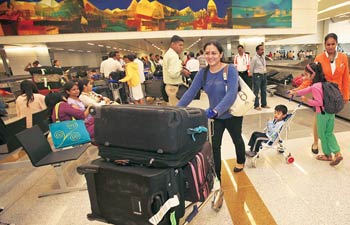
New Delhi, August 17: The government's auditor shared with parliament today a report that says that thousands of crores have been lost in the way in which coal mines were allocated to private players; another report finds fault with how the Delhi international airport was privatised. The government has prepped a detailed defense for both sectors; it will argue that the auditor's calculations are erroneous.
The Comptroller and Auditor General's (CAG) report on the Delhi airport finds that 1.63 lakh crores were lost in the way in which land was leased .
The government's auditor has also objected to the permission granted by the government to the Delhi airport consortium to charge passengers a development fee to help raise funds for the project. The auditor said this was not part of the original contract. The CAG says Delhi International Airport Limited (DIAL) will get an undue benefit of over Rs. 3,400 crore from the development fee.
DIAL charges passengers between Rs. 400 and Rs. 2600, depending on whether they're flying domestically or internationally.
The Delhi airport is run by a public-private partnership between the GMR group, which has 54% stake, and the Airports Authority of India, which is part of the government. Germany's Fraport AG and Malaysia Airport Holdings are the other minority partners in the venture that has operated the Delhi airport since 2006.
The auditor says that land was given to the airport project at highly concessional rates - 4800 acres were allotted, of which 239 acres could be used for commercial purposes like shops at Rs. 100 a year. The auditor says that the earnings from this commercial exploitation will be 1.63 lakh crores.
But in a statement earlier this year, the public-private partnership that handles the airport, referred to as DIAL (Delhi International Airport Limited), rebutted that "It (Rs. 1.63 lakh crore) is simply the absolute amount of revenues that accrue to DIAL over 58 years (45.99 per cent of the same will be shared with Airport Authority of India) - and does not represent the time value of money."
The government will point out that the token rent charged for the land saves the state-run Airports Authority of India hundreds of crores as stamp duty. The government will also emphasise that the concessions available to GMR to run the Delhi airport were part of the bid documents and were available to every bidder, so no preferential treatment was shown to GMR, which landed the project.
The CAG further points out that DIAL was allowed to extend its contract (for Operations, Maintenance and Development of the airport) for another 30 years. This, they say, is a deviation from the cabinet decision of September 11, 2003. The CAG, in its report, says, no infrastructure operator may be allowed to renew lease or extend its contract on identical terms.
The government says this position is factually incorrect as the decision to extend the contract was taken by an Empowered Group of Ministers (EGoM) - which had been constituted - based on a cabinet note of 2003.





Comments
Add new comment